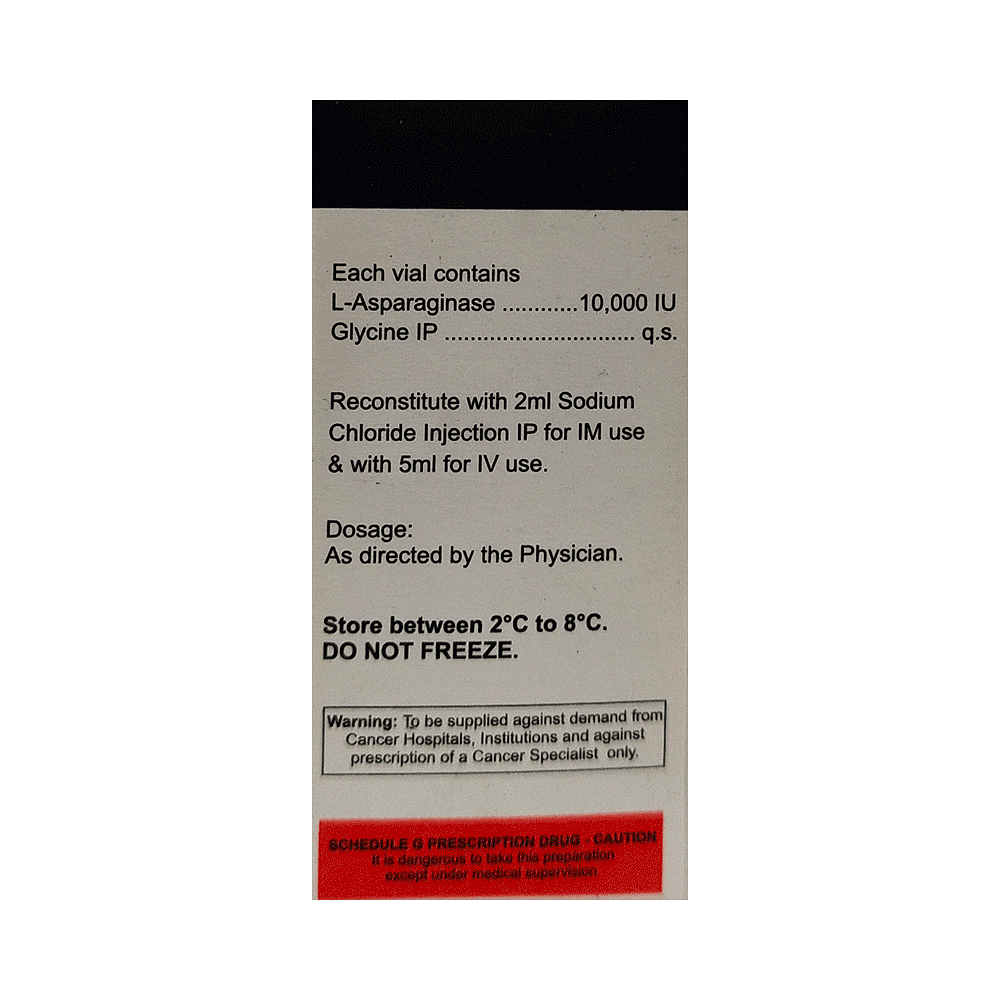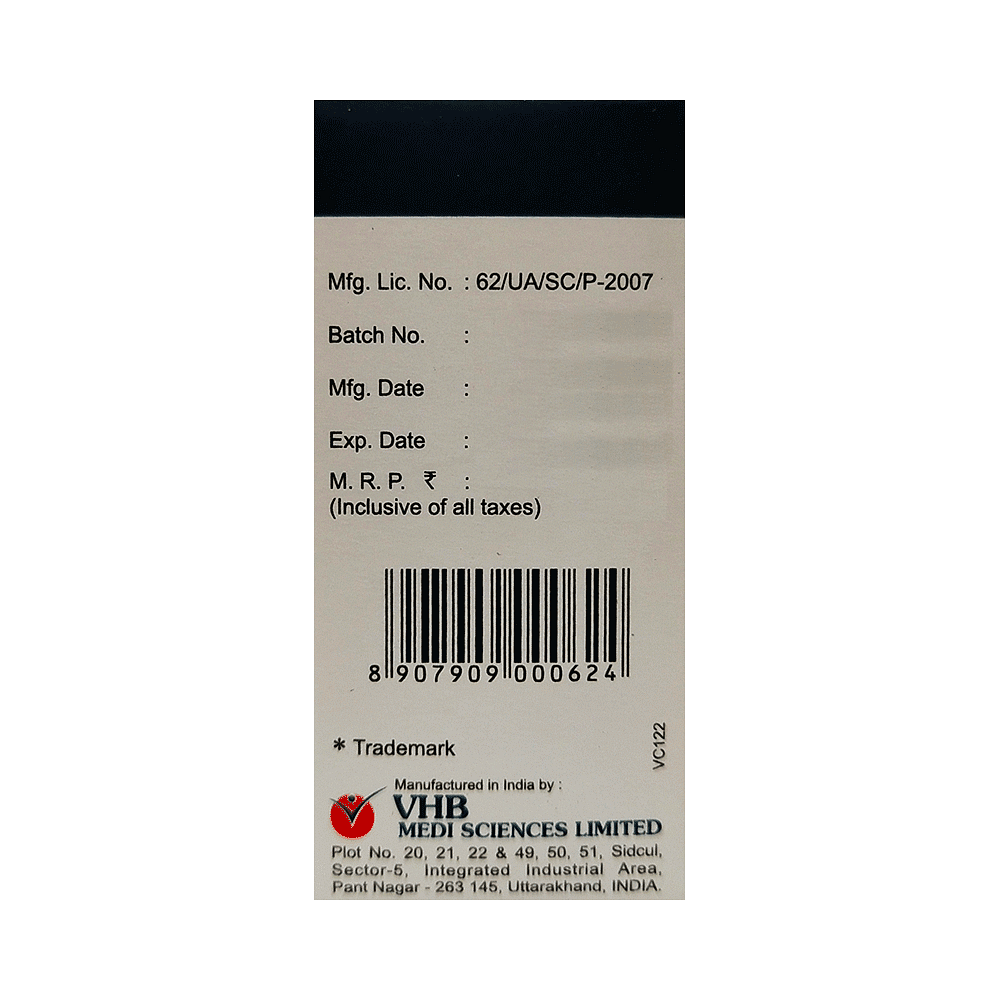


Leucoginase Injection
Manufacturer
Vhb Life Sciences Inc
Salt Composition
Asparaginase (10000IU)
Key Information
Short Description
Leucoginase Injection is used in the treatment of some kinds of cancer of white blood cells (leukemia).
Dosage Form
Injection
Introduction
Leucoginase Injection is given as an injection by the doctor, but try to have it the same time each day to make sure it has the best effect. Your doctor will decide what dose is necessary and how often you need to take it. This will depend on what you are being treated for and may change from time to time. You should take it exactly as your doctor has advised. Taking it in the wrong way or taking too much can cause very serious side effects. It may take several weeks or months for you to see or feel the benefits but do not stop taking it unless your doctor tells you to.
Directions for Use
Your doctor or nurse will give you this medicine. Kindly do not self-administer.
Safety Information
Side Effects
breathlessness rash vomiting angioedema (swelling of deeper layers of skin) nausea
Alcohol Warning
It is not known whether it is safe to consume alcohol with Leucoginase Injection. Please consult your doctor.
Breastfeeding Warning
Leucoginase Injection is probably unsafe to use during breastfeeding. Limited human data suggests that the drug may pass into the breastmilk and harm the baby.
Pregnancy Warning
Leucoginase Injection may be unsafe to use during pregnancy. Although there are limited studies in humans, animal studies have shown harmful effects on the developing baby. Your doctor will weigh the benefits and any potential risks before prescribing it to you. Please consult your doctor.
Quick Tips
Leucoginase Injection is given as an injection into the veins, muscles or under the skin by the healthcare provider. It is advisable to drink plenty of fluids and stay hydrated while taking this medication. Use an effective method of birth control to avoid pregnancy while taking this medication. You may need to have blood tests to monitor your blood cells, liver function and kidney function during treatment. It can cause an increase in blood sugar levels. Hence, monitor your blood sugar level regularly.
Frequently asked questions
When should I seek immediate medical attention?
Seek emergency care immediately if you experience signs of a severe allergic reaction like difficulty breathing, hives, itching, and blisters. Notify your doctor promptly if you develop severe headache, chest pain, intense abdominal pain, or swelling in various body parts.
Can Leucoginase Injection damage my liver?
Leucoginase Injection may have effects on the liver and could cause serious or life-threatening harm to the liver. Notify your doctor immediately if you experience severe stomach pain (upper right side), dark urine, clay-colored stools, persistent tiredness, itching, or jaundice (yellowing of the skin or eyes).
I am experiencing nausea and extreme fatigue. Is this related to Leucoginase Injection?
Nausea and fatigue are common side effects associated with Leucoginase Injection treatment. Eat small, frequent meals to alleviate nausea. Avoid salty, spicy, fried, or fatty foods; stay active by engaging in light exercise daily.
How can I manage diarrhea while taking Leucoginase Injection?
Foods high in soluble fiber can aid in relieving diarrhea by absorbing excess fluids from the body. Examples include bananas (ripe), oranges, boiled potatoes, white rice, curd, and oatmeal. To stay hydrated, drink 8-10 glasses of water throughout the day. You can also consume soups or juices frequently.
I have noticed changes in my skin after taking Leucoginase Injection. What should I do?
Apply a moisturizer to alleviate rashes, dryness, and itching associated with the treatment. Avoid direct sunlight exposure; use SPF 30 (or higher) sunblock and protective clothing. If you experience yellowing of your skin, contact your doctor immediately as it could indicate liver issues.
Can Leucoginase Injection cause hyperglycemia?
Yes, Leucoginase Injection can cause hyperglycemia or raise blood sugar levels. Regularly monitor your glucose level and inform your doctor if you observe a sudden spike in levels.
I am experiencing swelling and muscle cramps. Should I notify my doctor?
You may experience weakness, muscle cramps, and swelling in different parts of your body due to low albumin levels. Consult your doctor who will recommend blood tests to monitor your albumin levels.
Should I avoid all food and drinks while taking Leucoginase Injection?
Continue with your regular diet unless instructed otherwise by your doctor. Regular sips of water are crucial to prevent dehydration. Opt for small, simple but nutritious snacks every few hours instead of large meals. Suck on hard candy or popsicles as needed to prevent nausea and vomiting.
What should I avoid during my treatment with Leucoginase Injection?
Avoid caffeine; it can increase dehydration risk. Also, refrain from fatty, fried, spicy, and overly sweet foods that may trigger nausea. Avoid alcohol and smoking. If you're in close proximity to someone with a cold or if exposed to the sun, it’s advisable to take precautions like avoiding crowds. Seek medical advice before getting immunizations/vaccinations. Use caution when handling sharp objects and avoid contact sports to prevent cuts and injuries.


